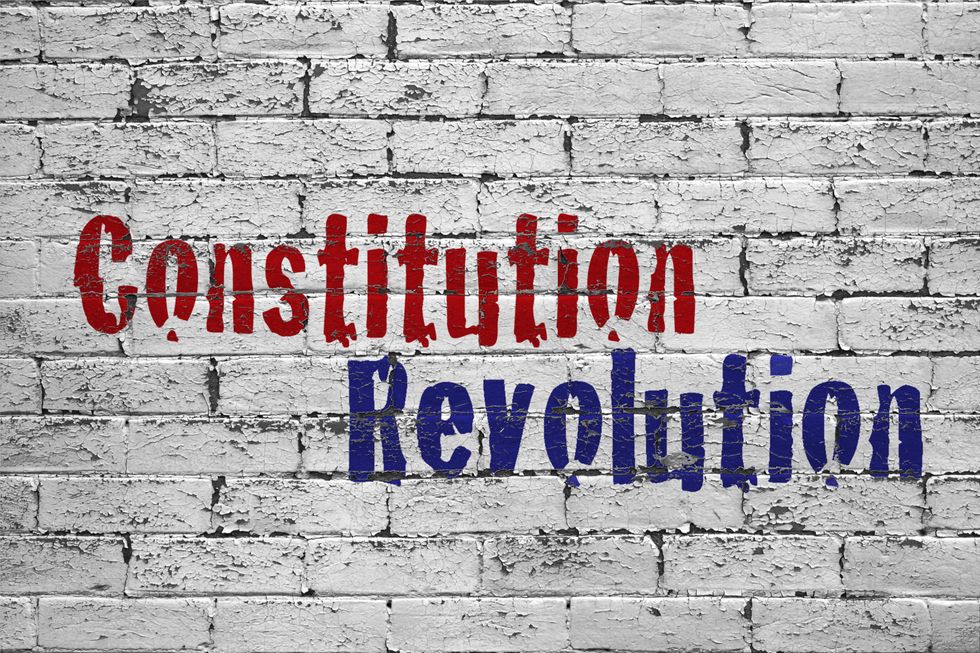
Photo Courtesy of Author.

This post is the continuation of a weekly Constitution Revolution series for TheBlaze.com and TheBlaze Radio’s Chris Salcedo Show. Click here for last week’s lesson.
This story has been updated.
–
In my latest post I made it mind-numbingly clear that it is unconstitutional for executive agencies like the Environmental Protection Agency or the Department of Health and Human Services to engage in any kind of policy-making.
Article 1, Section 1 of the Constitution states that “All legislative power herein granted shall be vested in a Congress.” It’s hard to think of how a clause could be a whole lot clearer than that.
But if you even dare to suggest the possibility that executive agency law-making is unconstitutional, most advocates of big government will completely freak out on you. I know this because it has happened to me on several occasions. They freak out because our progressive friends know that without the massive federal bureaucracy we have today, it would be impossible for them to get the government involved in every aspect of your life.
Because of that they are willing to do anything necessary to defend the legitimacy of executive agency law-making. In my experience, I’ve seen two arguments used most often to try to justify this obviously unconstitutional process.
First, I’ve heard people claim that executive agencies don’t make laws. They just issue regulations!!
This one is just silly. Do you have to comply with the regulations that come out of agencies like the EPA? Sure you do. And if you don’t, will someone from the government come out and either fine you or put you in prison? Of course they will.
So they are laws.
Just changing what you call something doesn’t change the substance of what you are doing. Executive agencies are creating rules where rules didn’t exist before. That is exactly the kind of policy-making decision that only Congress has the authority to make.
The second excuse I’ve often encountered - and probably the most common justification for executive agency law-making - goes something like this:
“Sure, technically the Constitution does give Congress all of the power to make laws. But Congress can delegate some of that power to other branches if they want!”
You can look through the Constitution all you want; you will not find a place that comes anywhere near granting Congress the authority to delegate its lawmaking power to anyone. That authority is completely made up.
Not to worry though. The supporters of executive agency law-making aren’t deterred by the complete lack of anything whatsoever in the Constitution to support their position. This is where they reach back and grab for the Holy Grail of progressive Constitutional interpretation theories.
“We realize that this power isn’t in the Constitution in actual words,” they’ll admit, “It’s one of Congress’s implied powers.”
Not surprisingly, this claim is easily disproven as well.
There are areas of the Constitution where the Founders intended to make exceptions to powers that were granted to the federal government. We know this because - believe it or not - they actually wrote those exceptions in the Constitution.
A great example of this comes in Article 2, Section 2 where it gives the Senate the responsibility of confirming presidential appointments. Right after that power is granted, this section goes on to say:
“…but the Congress may by Law vest the Appointment of such inferior Officers, as they think proper, in the President alone, in the Courts of Law, or in the Heads of Departments.”
So in this section, the Founders made sure there was no doubt that when members of Congress felt it was appropriate, they did have the ability to delegate some of their power to confirm lower-level presidential appointees to other areas of the government.
That’s a big deal because it means if you truly think that executive agency law-making is Constitutional, you would have to believe the following:
That isn’t even remotely possible. It’s lunacy.
In the end though, all of this is academic. I truly believe that even the people who support executive agency law-making know deep down that it’s unconstitutional. They just don’t care. If they have to side-step the Constitution in order to implement their agenda then they are more than willing to do that.
But don’t forget that now that we’ve allowed these big government progressives to render the Constitution meaningless, there is nothing left to protect you from government but the virtue of our politicians. Now stop and think about that. If a person is willing to destroy something as valuable as the Constitution to get what he wants, what reason do you have to believe that he will treat your rights or your freedom any differently?
Chad Kent is an author and speaker with a unique style that makes the Constitution simple and fun. Listen to Chad every Saturday during The Chris Salcedo Show on TheBlaze Radio and visit his web site at www.ChadKentSpeaks.com.
–
TheBlaze contributor channel supports an open discourse on a range of views. The opinions expressed in this channel are solely those of each individual author.